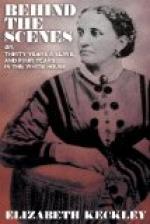* * * * *
Sold in the market.
I was only in the yard a short time before I was bought by one George Reid who lived in Richmond. He had no wife, but an old lady kept house for him and his three sons. At this time he had a place in the postoffice, but soon after I came there he lost it. He then moved into the country upon a farm of about one thousand acres, enclosed by a cedar hedge. The house was a plain frame structure upon a stone basement and contained four rooms. It was surrounded with shrubbery, and was a pleasant country seat. But I did not like it here. I grieved continually about my mother. It came to me, more and more plainly, that I would never see her again. Young and lonely as I was, I could not help crying, oftentimes for hours together. It was hard to get used to being away from my mother. I remember well “Aunt Sylvia,” who was the cook in the Reid household. She was very kind to me and always spoke consolingly to me, especially if I had been blue, and had had one of my fits of crying. At these times she would always bake me an ash cake for supper, saying to me; “My child, don’t cry; ‘Aunt Sylvia’ will look after you.” This ash cake was made of corn meal and water, a little salt to make it palatable, and was baked by putting it between cabbage leaves and covering it with hot ashes. A sweeter or more delicious cake one could not desire, and it was common upon the tables of all the Virginia farmers. I always considered it a great treat to get one of these cakes from “Aunt Sylvia.”
The appellations of “aunt” and “uncle” for the older slaves were not only common among the blacks, but the whites also addressed them in the same way.
* * * * *




